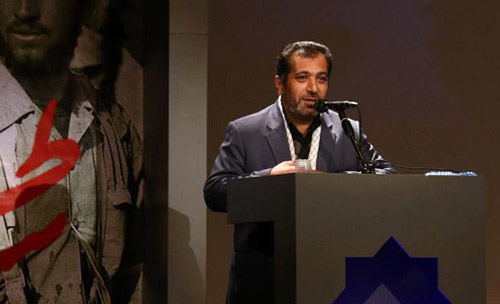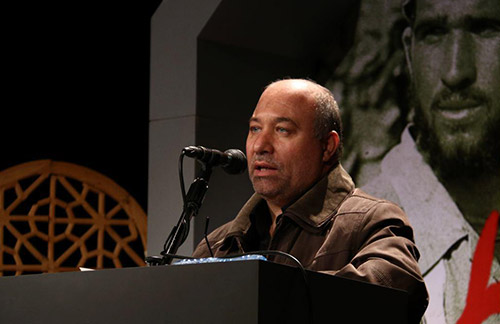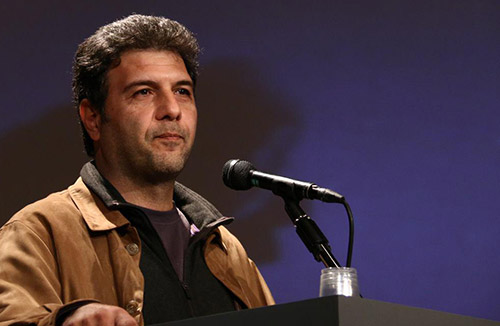274th “Memory Night”
A first time recited memory
Nazanin Sasanian
Translated by Natalie Haghverdian
2016-12-4
According to Iranian Oral History Site report, two hundred and seventy-four in a series of memory night programs was held on Thursday, 24 November 2016 at the Art Center. During the ceremony, Mohammad Majidi, Mohammad Ibrahim Behzadpour and Amir Hossein Jojjat recited their memoirs of the Holy Defense.
Memoirs of captivity
Mohammad Majidi from Malayer was the first to recite his memoirs. He stated that he has just returned from Kerbala and then recited his memories of his time in the fronts and said: “It was three or four days before I left that my mother had dreamt that Iraq has attacked Iran and has taken only me captive from our village. We had decided to join the forces a night before in the mosque but a mother’s heart always knows. I had failed twice in my efforts to join the forces so I tampered my ID and I was deployed. There was a flag hanging in front of the bus. It read: “A trip is not that on Egypt to Baghdad/Sacrifice is the path of men”. I read it once and the poem along with my mother’s dream kept me busy from Hamedan to Ahwaz.”
He explained how he was taken captive by saying: “I was injured in head, leg and chest in the second phase of Karbala 5 operation when I was 14 and then I was taken hostage. I passed out because of my injuries and when I came through I was in Haroun Olrashid hospital. There was one Basij soldier in every room taking his last breath and each were praying. One by one their sound of groan died and I was left alone. I was taken to surgery three days later and once I opened my eyes I was chained to the bed.”

He continued: “The nurse didn’t acknowledge that I was in surgery and said: “You were restless in your sleep so we chained you to the bed.” Once I was being discharged from the hospital I met an acquaintance who said that we are in Basra and we are taken captive. Before, I didn’t know where I was. When I came out there were reporters interviewing people. I was wearing thawb so I turned my back to the cameras. Those who were interviewed were identified by Iranian authorities but not me.”
Majidi said: “A while after walking around in Basra, and Iraqi officer took my plaque and beat Mr. Ansari, Commander of a battalion from division 25 of Karbala and me till we got to Baghdad. Others in the bus were not beaten but they were groaning with me. I wanted to tolerate the pain and keep silent but I was just out of surgery. We got to the entrance of Iraqi intelligence and I couldn’t walk so two other captives helped me. An enemy officer through me on the ground and hit me with butt stock. He was big and his hands were red like lead. Once he slapped me, I couldn’t see or hear anything. In the middle of the cold winter they boarded us to a meat transport truck and our body would stock to the metal body of the car. He beat us so bad that a couple of soldiers were martyred on the entrance of the intelligence base.”
He stated that “Camp 11 was the first camp of missing persons” and continued: “We wouldn’t dare to say that we are sick. Most captive soldiers were sick; I was gravely ill myself. It was so bad that once I returned from the infirmary after three days, others took me for a new captive. I got myself sick so that I could make it to the infirmary for a mission.”
He added: “Four captives wrote the names of all on the lining of a blanket and made it to the border but they were arrested. It took four days since they got away and then arrested and we tolerated constant beating during these four days since it was the camp for Basij soldiers. In order to teach others a lesson, the beating was really hard. By the sun set, the captives were exhausted. I said: I want to put up a show. Others said that the Iraqi soldiers are angry because of the escape and it is dangerous but do it if you want. There was a report on Rudbar earthquake so I started running around the room screaming pretending that I’m from the region and I’ve seen my family house ruined. Three captives were sent to solitary and I was taken outside. An Iraqi soldier was upset learning about my situation and brought me pills.”
He finished his story by talking about a high ranking officer of Baath party: He had written in his memoir: “I was in my office that the party called and summoned me. In the central office they gave me a file containing my son’s ID card and plaque. He was studying in the States but had returned to Iraq to participate in the war. On my way to identify the body I prayed God to have merci on my wife. I saw the corpse and I realized it’s not my son. However, I claimed him and took the corpse outside the city to leave it there but I couldn’t. I went further and further to Karbala. On the entrance of Bein Olharamein there was a grave and I buried the body there and said prayers for the first time. Something I hadn’t done on my parents’ grave. At the time of prisoners’ exchange my son returned. He said that he was taken in Shalamcheh. He said that a Basij soldier brought me water and clothes and politely asked me to hand him my card and plaque. I said that I wouldn’t do it unless I know the reason. He said: we returned from an operation last night and I fell asleep here. A lady came to my dream and said: I’m here to give you good news. With a card and plaque containing such information you’ll rest in Karbala forever besides my son Hossein.”
To the last minute …
Later in the program, Mohammad Ibrahim Behzadpour stated that “I’m just a humble soldier among all those who sacrificed their life during eight years of the Holy defense” and said: “There are as many stories as the number of soldiers who fought in the war but we only recite a few to give you something to remember us. Martyr Mohssen Taghizade was my friend. Before Valfajr Operation he said something in prediction which happened later. He said: I saw in my dreams that I’m flying with angels. The soldiers of Komeil battalion were martyred in thirst in Valfajr Operation and Imam Khomeini described them as Angels of God. Mohssein had a brother, Masoud who was martyred in Valfajr 4 operation. Both were missing until their bodies were found later in two different locations and brought home.”

He said: “Masoud came to me and said: I know who will be martyred in this operation. Before the operation we said Komeil prayer and he was crying badly; we tried to stop him but he said: leave me alone to talk to my Imam. Later he said: I saw Imam Hossein that night with my own eyes and told him that I want to sacrifice my life for him. Masoud was one of those whose body wasn’t fount for 10-12 years.”
Behzadpour spoke of the importance of Fav and the war in that region and said: “In Valfajr 8 operation I was with 8 battalion of Seyyed Ul-Shohada 27 Division. The operation lasted for almost 70 days. Once Saddam lost control over Fav many of his experience soldiers were killed. He gathered others and trained them to recapture Fav. Our connection with Iraqi divisions was a canal of 400 meters where we would hide. We learned that Iraqi’s are planning a counter attack and we fired till midnight. Then in the silence of the night we heard them moving towards us and the next day the real war broke out. They wanted to surrender Fav to Arvand Rud. One of our soldiers moved out of the canal and a bullet was fired to him; he fell I realized he is dying but then he got up again to join the battle. The commander tried to stop him but he said: You told me to join this war and now you are holding me back?! Imam asked me to join the war and I will fight it to the end.”
What was he seeing that we couldn’t see?
Amir Hossein Hojjat, documentary filmmaker was another speaker to share his memoirs. He said: “I imagined that battle field is where there is a lot of noise and bullets are fired and grenades explode. But once we got there, it was peaceful and quiet! Later I figured that we are behind the line of brigade Ramadan 20.”

He said: “One of my most memorable stories is about an old man. I was 16 when I joined the army. I was sleeping in the trench and when I opened my eyes there was a man sitting there with an odd face. I asked: who are you? He said: I’m Noori. Most elderly soldiers had white beard but he wasn’t like that. His face was odd but shaved. Later I learned that he is Baba Noori the father of brigade Ramadan 20. He had odd features and appearance. He was very careful of his appearance and believed that hygiene is very important.”
He continued: “Once new forces would join the brigade, Baba Noori would say: “Say Ayat Alkorsi prayer and you shall be safe; your families are waiting for you. Other soldiers would swear that they had seen bullets flying towards Baba Noori but missed him. I asked him about Ayat Alkorsi and its secret but he refused to talk about it. One day he got fed up and said: “Look kid! I made a deal with God, I asked Him something! I haven’t shared this with anyone and now I’m telling you. Baba said: “I’ve been here since the beginning of war! And I asked God to keep me safe to the end but wouldn’t return me home after.” I asked: “What do you mean?” He said: “You don’t get it. Asking for martyrdom is of higher ground but living in this condition is no living. I’m old and I’ve lived my life. You don’t understand this place! His tone changed at this point and I’ll never forget it. I’ve been thinking about what he said for all these years. What did he mean that living in this condition is no living! What was he seeing that we couldn’t?”
Hojjat explained how Baba Noori was martyred and said: It was a very hot day and we were in a horrifying operation. After three whole days of fighting we were exhausted. One morning Mr. Sharifi asked: “Why didn’t Baba Noori called us for prayer? Find him.” The soldiers found him on top of a hill prostrated towards Qibla and a quiver had penetrated his skull. Nobody dared to go up and we were just standing there watching. Many of that battalion soldiers returned to the city with his body. In his funeral his daughter was crying and said: “He was you father not mine!”
He said: “I returned home after his funeral and once family and friends inquired I said: “war is over! And it was over as he had said.” When I think about life I think of Baba Noori. Once I took my camera to make films I always wondered what I should ask from God. How should I live? Baba Noori said these things in confidence and after this many years this is the first time that I’m repeating it.”
This program was organized in collaboration with the Study and Research Center of Resistance Culture and Literature and the Office of Resistance Literature and Art on Thursday 24 November 2016 in the Art Center.
Number of Visits: 4146








The latest
Most visited
Hajj Pilgrimage
I went on a Hajj pilgrimage in the early 1340s (1960s). At that time, few people from the army, gendarmerie and police went on a pilgrimage to the holy Mashhad and holy shrines in Iraq. It happened very rarely. After all, there were faithful people in the Iranian army who were committed to obeying the Islamic halal and haram rules in any situation, and they used to pray.A section of the memories of a freed Iranian prisoner; Mohsen Bakhshi
Programs of New Year HolidaysWithout blooming, without flowers, without greenery and without a table for Haft-sin , another spring has been arrived. Spring came to the camp without bringing freshness and the first days of New Year began in this camp. We were unaware of the plans that old friends had in this camp when Eid (New Year) came.
Attack on Halabcheh narrated
With wet saliva, we are having the lunch which that loving Isfahani man gave us from the back of his van when he said goodbye in the city entrance. Adaspolo [lentils with rice] with yoghurt! We were just started having it when the plane dives, we go down and shelter behind the runnel, and a few moments later, when the plane raises up, we also raise our heads, and while eating, we see the high sides ...The Arab People Committee
Another event that happened in Khuzestan Province and I followed up was the Arab People Committee. One day, we were informed that the Arabs had set up a committee special for themselves. At that time, I had less information about the Arab People , but knew well that dividing the people into Arab and non-Arab was a harmful measure.

